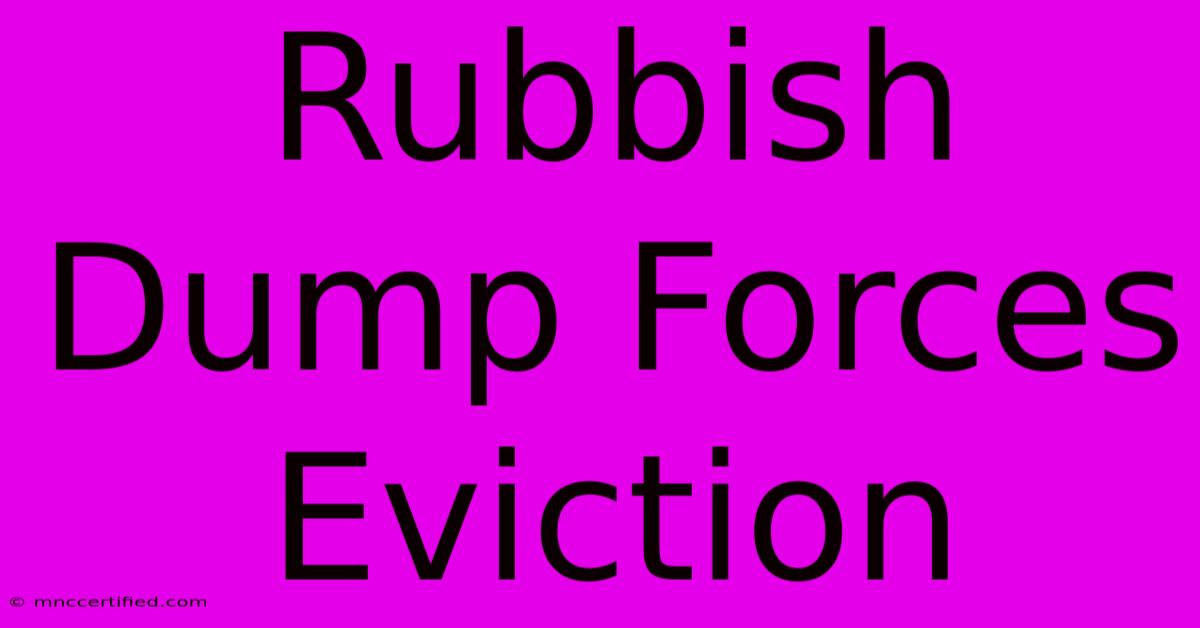Rubbish Dump Forces Eviction

Table of Contents
Rubbish Dump Forces Eviction: Understanding the Legal and Environmental Ramifications
A rubbish dump forcing an eviction is a serious situation, fraught with legal, environmental, and personal consequences. This article explores the complexities of such a scenario, providing guidance for those facing this distressing predicament. We'll examine the legal grounds for eviction, the environmental hazards posed by illegal dumping, and the steps you can take to protect yourself.
Understanding the Legal Basis for Eviction Due to a Rubbish Dump
Eviction due to a rubbish dump isn't always straightforward. The legal grounds depend heavily on several factors, including:
- Ownership of the property: Are you a tenant, homeowner, or landowner? Your rights and responsibilities differ significantly.
- Location of the dump: Is the rubbish on your property, a neighbour's property, or on public land adjacent to your property?
- Responsibility for the dump: Who is responsible for the illegal dumping? Is it a neighbour, a fly-tipper, or even a result of inadequate waste management by the local council?
- Extent of the dumping: Is it a minor accumulation of rubbish or a large-scale illegal dumping site? This impacts the severity of the problem and the legal response.
Tenants: If the rubbish dump is on your property and you are a tenant, your lease agreement might outline responsibilities regarding waste disposal. If the issue is caused by a neighbour, you should inform your landlord immediately. They are legally obliged to address issues affecting habitability. Failure to do so might provide grounds for breaking your lease without penalty.
Homeowners: As a homeowner, the responsibility for dealing with the rubbish dump falls squarely on you. You may need to take legal action against the responsible party or hire a professional waste removal service. The local council may also become involved, depending on the severity of the situation. In extreme cases, the council might issue a notice to comply, and failure to comply could lead to legal action, potentially culminating in eviction.
Landowners: Similar to homeowners, landowners bear responsibility for managing waste on their property. If the dump renders the land uninhabitable or unsafe, this can be used as a basis for potential eviction orders.
Environmental Hazards of Illegal Rubbish Dumps
Illegal rubbish dumps pose significant environmental risks. These include:
- Soil and water contamination: Leaking chemicals and toxins from discarded materials can contaminate soil and groundwater, rendering it unsafe for human use and impacting local ecosystems.
- Air pollution: Burning rubbish releases harmful pollutants into the air, contributing to respiratory problems and other health issues.
- Pest infestation: Rubbish dumps attract rodents, insects, and other pests, creating unsanitary conditions and potential health hazards.
- Attracting wildlife: Animals may be drawn to the rubbish, creating further problems with pests and potentially hazardous encounters.
Protecting Yourself: Steps to Take
If you're facing eviction due to a rubbish dump, here's what you should do:
- Document everything: Take photos and videos of the rubbish dump, noting the date and time. Gather any evidence that might help identify the responsible party.
- Report the illegal dumping: Contact your local council's environmental health department immediately. They have the power to investigate and take enforcement action against those responsible for the illegal dumping.
- Seek legal advice: Consult a solicitor specialising in property law or environmental law to understand your rights and options. They can advise on the best course of action, whether it's negotiating with the responsible party, pursuing legal action, or seeking alternative accommodation.
- Keep records of all communication: Maintain records of all correspondence with the council, neighbours, and any legal professionals involved.
- Explore all avenues: Explore options such as mediation or arbitration to resolve the situation without resorting to full-scale legal action.
Keywords: Rubbish dump, eviction, illegal dumping, environmental hazards, legal action, tenant rights, homeowner responsibilities, waste disposal, council enforcement, environmental health, legal advice, property law, fly-tipping, waste removal, pollution, contamination.
Off-Page SEO Strategies:
- Build backlinks to this article from relevant websites and blogs focusing on environmental issues, legal matters, and property management.
- Share the article on social media platforms, using relevant hashtags like #rubbishdump #eviction #environmentalhazard #flytipping #legaladvice.
- Engage with relevant online communities and forums to increase visibility and build awareness.
This article provides a comprehensive overview of the issue. Remember, seeking professional legal and environmental advice is crucial when dealing with this complex situation. Early action is key to mitigating the risks and protecting your rights.

Thank you for visiting our website wich cover about Rubbish Dump Forces Eviction. We hope the information provided has been useful to you. Feel free to contact us if you have any questions or need further assistance. See you next time and dont miss to bookmark.
Featured Posts
-
Chargers Vs Bengals Live Updates Sunday
Nov 18, 2024
-
Danny Jones And Wayne Rooneys Outing
Nov 18, 2024
-
Watch England Vs Ireland Uefa Nations Live
Nov 18, 2024
-
Overturned Hay Trailer Essex
Nov 18, 2024
-
Lions Goff Makes Nfl History
Nov 18, 2024